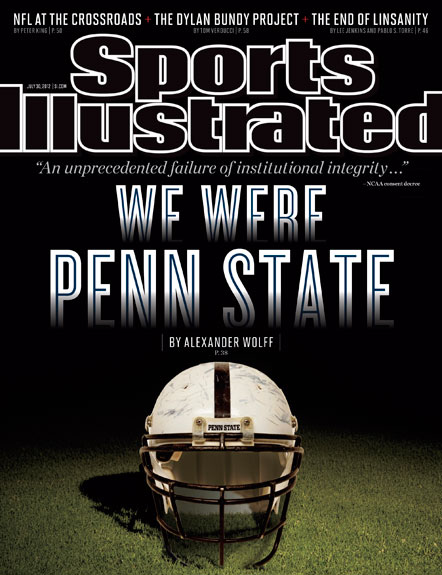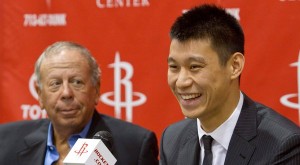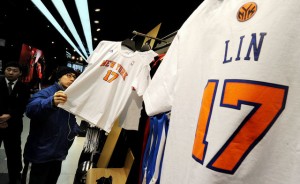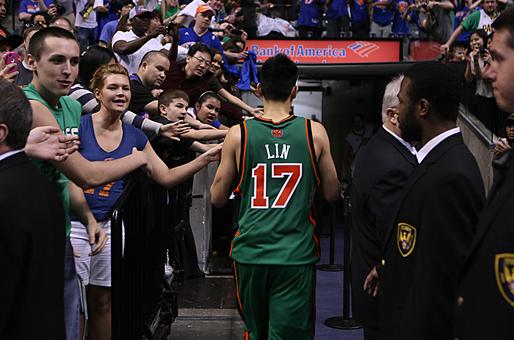 It’s been nearly a month since Jeremy Lin was acquired by the Houston Rockets after the New York Knicks elected not to match his three-year, $25.1 million offer sheet. Lin’s departure is still a frequent topic of conversation on New York sports-radio as fans either place the blame on him for leaving their team or at the Knicks for refusing to retain him despite the large luxury-tax penalty they faced in the deal’s third year. Although the Knicks have been tight-lipped on the matter, Lin’s former teammate Carmelo Anthony called his deal “ridiculous” after the details emerged but later stated before the contract’s deadline that he would “definitely love to see him back.”
It’s been nearly a month since Jeremy Lin was acquired by the Houston Rockets after the New York Knicks elected not to match his three-year, $25.1 million offer sheet. Lin’s departure is still a frequent topic of conversation on New York sports-radio as fans either place the blame on him for leaving their team or at the Knicks for refusing to retain him despite the large luxury-tax penalty they faced in the deal’s third year. Although the Knicks have been tight-lipped on the matter, Lin’s former teammate Carmelo Anthony called his deal “ridiculous” after the details emerged but later stated before the contract’s deadline that he would “definitely love to see him back.”
There have also been numerous articles written on Lin since he left the Big Apple but none were as revealing as the “Return To Sanity” story by Lee Jenkins and Pablo S. Torre that appeared in the July 30 issue of Sports Illustrated. In the piece Lin actually opens up about his experience in New York and describes his popularity as being uncomfortable and even dangerous. When we witnessed Lin dismantling the defense of the Los Angeles Lakers, draining three-pointers over Dirk Nowitzki, making an impressive crossover move on John Wall then finishing with a vicious dunk, and even hitting a game-winner against the Toronto Raptors no one imagined that things weren’t as easy for him off the court. As Lin stated in the article, “I had a lot of weird things happen to me, a lot of creepy stuff. Some people are so aggressive: ‘Give me this picture, give me this signature,’ Sometimes they’ll follow me back to my car, knock on my window and pull on my door. That really scares me. I have no idea what they’re going to do. They’re banging on the car. I was just like, Oh, my gosh, what is going on? It kind of freaked me out.” As a result, Lin rarely left his hotel room unless it was for a game or a practice.
The article also delves into the mind of Jeremy Lin, who is probably the most reluctant superstar that we’ve ever seen in sports. He opens about traveling to Times Square for the first time in a disguise and being in awe when he sees his t-shirts and jerseys on sale. It’s almost as if he didn’t realize his economic impact until he made that trip. I spoke with Lee Jenkins, NBA writer for Sports Illustrated, about the eye-opening journey that he and Torre took readers on and asked him how they were able to capture the last days of Linsanity in New York.
 How did you and Pablo S. Torre collaborate on this piece? What role did he play and what role did you play?
How did you and Pablo S. Torre collaborate on this piece? What role did he play and what role did you play?
Pablo went to Harvard and actually profiled Jeremy Lin when he played for Harvard. So when Jeremy Lin burst onto the scene with the Knicks, Pablo did the first feature on him in the NBA and then another one a week later and both were cover stories. He really developed a strong relationship to the point that Pablo was the first person Lin talked to after he left the Knicks and that became a story for SI.com. Pablo then used some of the reporting that he did on Lin before for the context of this story and also did the interview with Lin for this story. I went to Houston and did more of the Rockets side and spoke to some people who were close to Lin. Pablo also talked to people close to Lin. As far as the writing, I wrote the first runthrough of the story and then Pablo looked at it and made a lot of great recommendations and suggested some changes. We went over it and blended some of those in. It was a true collaborative effort.
We learned so much from this story. Many of us didn’t know about the details of Jeremy Lin’s four-hour meeting with the Houston Rockets on July 12. Please provide more background.
Pablo interviewed him once right after Jeremy left New York and then again a couple of days later. For the Web story it was more of a news story and for the magazine we try to go a bit deeper knowing that the story won’t come out for a while. For that July 12 meeting that was most of the Rockets brass and Kevin McHale was not able to make the July 4 recruiting visit to Houston so he was there and talked to Lin about the offense and about his role in it. They talked about what the Rockets do, about the other players on the roster, and some of the advanced statistics that they use which is somewhat unique in the NBA. Then they extended him the final contract offer for $25.1 million. He signed the offer sheet at that point because the offer sheet and the contract are two different signatures. So that day at the Golden Nugget he signed the offer sheet and the Golden Nugget is actually owned by a big Rockets fan. That’s why they stayed there and not on the strip.
So when was the initial offer of three years for $19 million made to him?
That offer was discussed during the recruiting visit to Houston on July 4. I know Jeremy then went back to the Bay Area to Palo Alto. He had a dinner with friends then another one with some old coaches. What they were celebrating really was the fact that he had gotten an offer from a team because that’s what the Knicks wanted. They wanted him to go test the market and get an offer from a team so that he could set the market value and they were going to match. That was the whole idea.
Didn’t he also have a dinner with the Knicks? Didn’t Knicks coach Mike Woodson say that they would “absolutely” match any offer made to Lin?
Earlier Lin had gone to L.A. and had dinner and Woodson was there. It was with some of the Knicks people. They kind of talked about Lin’s role and the Knicks moving forward. They were obviously very committed to him through that July 4 time period. Things only started to get dicey after the Rockets revisited the offer and decided to get more aggressive.
 So it was Houston who initiated the higher offer and not Lin?
So it was Houston who initiated the higher offer and not Lin?
That is what I got from Daryl Morey, the Rockets General Manager, that Leslie Alexander their owner saw that they were going to trade Kyle Lowry, their starting point, for a lottery pick and they were going to lose Goran Dragic to Phoenix to free agency which they really didn’t want. So at that point the Rockets had no point guard. They also had no center at that point. So Leslie Alexander told Morey that they should get more aggressive with Lin and then when it came time to make the final offer they were able to lay the terms. I know there has been a lot out there about Jeremy having a role in that but I think the Knicks might have burned themselves a bit because when Woodson came out and said they were going to match the offer then the Rockets knew that it wasn’t strong enough and they had to make it stronger.
From reading the piece Lin seemed a bit scared after experiences he had in New York in terms of his lack of privacy. I’m not sure if any of us knew that.
Yeah, I thought that was some really interesting information as well that Lin shared with Pablo. I think he was in the center of a tidal wave of celebrity and fame that he was clearly unaccustomed to. You’ve never seen a player burst on the scene as quickly as Jeremy Lin did and he did it on the biggest stage at Madison Square Garden. I think that some of the public attention he was definitely uncomfortable with where he didn’t want to leave his hotel a lot, eating room service almost exclusively. The times he did go out he got mobbed. There were parts of New York that were overwhelming. He still wanted to be a Knick and stay there but he was able to look at the downside of being famous in New York.
There seems to be a sigh of relief from him.
When you climb that quickly as he did in New York there is obviously going to be a tipping point on the other side. And I think he knew and everyone around him knew. There was no way he could sustain the performance he had for those few weeks when he took the nation by storm. At Houston he will be able to develop at a more regular rate. Clearly he became a superstar first and now he is trying to become a consistent NBA point guard and that’s something he will be able to do more under the radar than he was in New York. The offense will be more geared towards him because Kevin McHale’s system suits him a little bit better than Mike Woodson’s. He also won’t have a star like Carmelo Anthony who dominates the ball. There are a lot of reasons why Houston is a healthier place for him to be and I’m sure he detects that as well.
You r article talks about the MSG stock plummeting after Lin left the Knicks. We hear that but also know that Lin had the top-selling jersey, helped resolve the cable dispute between Time Warner and MSG Network, and we always see the Garden sold-out. Wasn’t there a chance that Lin could generate enough money for the Knicks to justify the $25 million contract?
r article talks about the MSG stock plummeting after Lin left the Knicks. We hear that but also know that Lin had the top-selling jersey, helped resolve the cable dispute between Time Warner and MSG Network, and we always see the Garden sold-out. Wasn’t there a chance that Lin could generate enough money for the Knicks to justify the $25 million contract?
That’s an interesting point. A lot of the money that gets brought in through jersey sales and a lot of marketing opportunities is split among the NBA teams. Even the Rockets will tell you that the impact of a player like this isn’t as much as the media states. The stock price going down was really interesting and surprising. Business experts said it was somewhat coincidental and it will likely recover if the Knicks are a good team. I’m sure when there are more events to play at Madison Square Garden the stock will recover. The Knicks felt that his impact was overstated a bit. In this case, they made what seems to be a hard business decision.
The Knicks aren’t commenting on this but weren’t able to stop Carmelo and J.R. Smith from commenting. You almost felt that Lin wouldn’t be a Knick once you read their quotes. Could you imagine him returning after that?
You are right. And Smith said he thought it might lead to some dysfunction in the locker room. Lin is an interesting case because you just don’t have players who are able to create value as quickly as he did. So you can argue that he wasn’t worth it because he didn’t do it long enough but you could also argue that he is great because of his potential. Clearly Smith and Melo thought the contract was exorbitant and in the end the Knicks did also. And there were also comments Smith made also about wanting to play with Jason Kidd and kind of leaving Lin out of that equation. Lin was a really good fit for Tyson Chandler and Amar’e Stoudemire and guys who are great on the pick and roll but less of a fit with J.R. and Carmelo.
We also heard of an apology issued by the Rockets to Jeremy for letting him go initially. How much of this contract was about being regretful and making amends for letting a potential star go?
I think the Rockets were really stunned. They pride themselves on not judging a player on how he looks but really based on productivity and performance. It’s stunned Daryl Morey their General Manager when he went on to have so much success with the Knicks and they felt the need to apologize and Lin was amused by how much they felt the need to apologize. Really when you look at it every team wiffed on Jeremy Lin and the Rockets, at least they had him in camp. Most didn’t even call to bring him in. When they saw a chance to make amends they did.
What is considered a success or failure for Jeremy Lin moving forward?
I think for him success means being an above average NBA point guard not an All-Star point guard because that’s unrealistic to ask of him right now. That’s certainly what would have been asked in New York although the Rockets do host the All-Star game next year and he will definitely get a ton of fan support.

